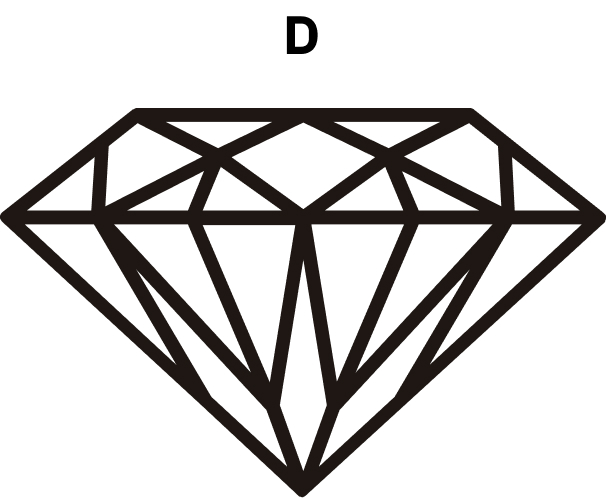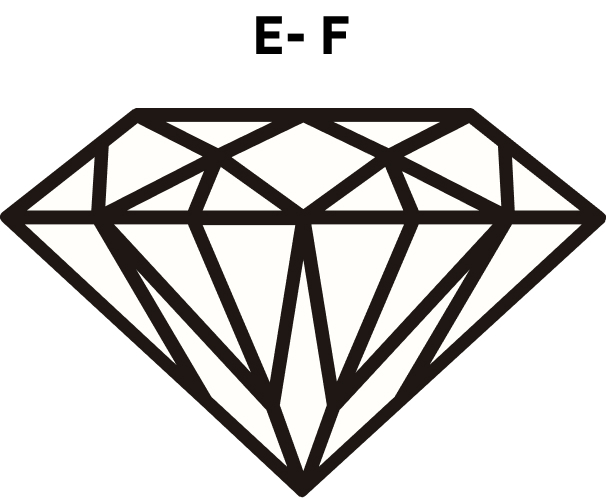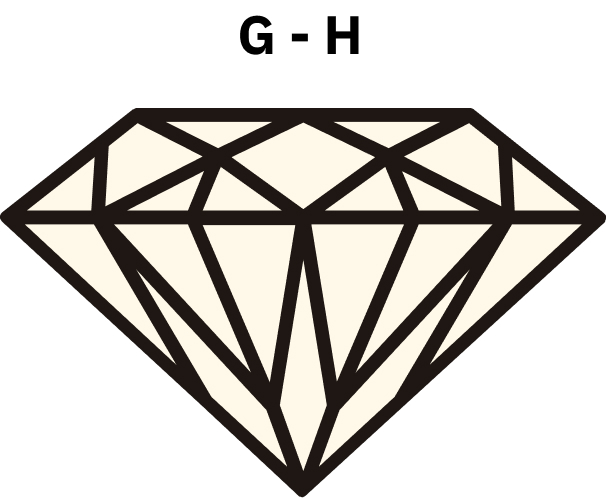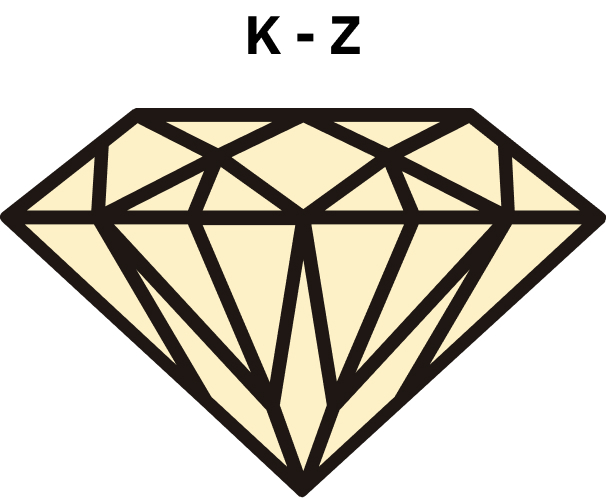

A Guide To Diamonds Color
Diamond Color Types

Colorless

Near Colorless


Noticeable Color

Diamond Color Grades
Color Visibility
D
Colorless
E
Colorless
F
Colorless
G
Near Colorless
H
Near Colorless
I
Near Colorless
J
Near Colorless
K
Faint Yellow
L
Faint Yellow
Understanding Lab Grown Diamond Color In Detail
Diamond color is a key aspect of a diamond's appearance and value. It refers to the presence or absence of color within the diamond, with the most valuable diamonds being completely colorless. Grading of diamond color is based on a scale from D to Z, with D representing colorless diamonds and Z indicating diamonds with noticeable color. The color scale encompasses a range of subtle variations, from icy whites to warm yellows and even fancy colors like pink, blue, and green.
Diamonds come in a spectrum of colors, each with its unique characteristics and appeal. Colorless diamonds (D-F) are prized for their purity and brilliance, appearing transparent and allowing maximum light to pass through. Near-colorless diamonds (G-J) exhibit minimal traces of color and offer excellent value for those seeking a balance between quality and affordability. Moving down the lab grown diamond color scale, diamonds in the faint yellow to light yellow range (K-M) may display a subtle tint of color, while diamonds in the N-Z range exhibit more noticeable color.
Beyond the traditional color scale, diamonds can also occur in fancy colors, including shades of pink, blue, yellow, green, and more. These fancy colored diamonds are exceptionally rare and highly sought after for their unique beauty and rarity.
Color Grading Scale
The diamond color grading scale used by gemological laboratories such as the IGI plays a crucial role in assessing the quality and value of diamonds. The scale ranges from D to Z, with D representing the highest level of colorlessness and Z indicating a diamond with noticeable color. Each letter grade corresponds to a specific range of color, with expert gemologists carefully evaluating the diamond under controlled lighting conditions to determine its precise color grade.
Which Diamond Color is Best?
The choice of the best diamond color depends largely on personal preference, budget, and the desired look. Colorless diamonds (D-F) are favored for their pure and timeless appeal, making them an excellent choice for classic and elegant jewelry pieces.
Near-colorless diamonds (G-J) offer exceptional value while still appearing white to the naked eye, making them a popular choice for those seeking high-quality diamonds at a more affordable price point.
For fancy colored diamonds, the "best" color is subjective and depends on individual tastes and preferences. Some may prefer the intense hues of fancy pink or blue diamonds, while others may gravitate towards the subtle beauty of fancy yellow or champagne diamonds. Ultimately, the best diamond color is the one that resonates with the wearer and complements their unique style and personality.
Diamond Color Grading Process
The diamond color grading process is a meticulous and standardized procedure conducted by trained gemologists using specialized equipment. During the grading process, the diamond is assessed for its hue, tone, and saturation under controlled lighting conditions. The gemologist compares the diamond to a set of master stones representing each color grade on the scale, ensuring accuracy and consistency in grading.
Do Diamonds Have Color?
Yes, all diamonds have some degree of color, although it may not always be visible to the naked eye. The presence or absence of color in a diamond is influenced by various factors, including the presence of chemical impurities and structural defects within the diamond crystal. In rare cases, diamonds may exhibit intense and vivid colors, known as fancy colored diamonds, which are highly prized for their rarity and beauty.
How To Choose the Best Diamond Color?
When selecting the best diamond color, it's essential to consider factors such as personal style, skin tone, 4cs of diamonds, and the intended setting for the jewelry piece. Those with a preference for classic and timeless designs may opt for colorless or near-colorless diamonds, while those seeking a pop of color may gravitate towards fancy colored diamonds. Consulting with a reputable jeweler can also provide valuable guidance and assistance in selecting the perfect diamond color that suits your preferences and budget.
Which Diamond Color is Best?
The choice of the best diamond color depends largely on personal preference, budget, and the desired look. Colorless diamonds (D-F) are favored for their pure and timeless appeal, making them an excellent choice for classic and elegant jewelry pieces.
Near-colorless diamonds (G-J) offer exceptional value while still appearing white to the naked eye, making them a popular choice for those seeking high-quality diamonds at a more affordable price point.
For fancy colored diamonds, the "best" color is subjective and depends on individual tastes and preferences. Some may prefer the intense hues of fancy pink or blue diamonds, while others may gravitate towards the subtle beauty of fancy yellow or champagne diamonds. Ultimately, the best diamond color is the one that resonates with the wearer and complements their unique style and personality.
Diamond Color Grading Process
The diamond color grading process is a meticulous and standardized procedure conducted by trained gemologists using specialized equipment. During the grading process, the diamond is assessed for its hue, tone, and saturation under controlled lighting conditions. The gemologist compares the diamond to a set of master stones representing each color grade on the scale, ensuring accuracy and consistency in grading.
Do Diamonds Have Color?
Yes, all diamonds have some degree of color, although it may not always be visible to the naked eye. The presence or absence of color in a diamond is influenced by various factors, including the presence of chemical impurities and structural defects within the diamond crystal. In rare cases, diamonds may exhibit intense and vivid colors, known as fancy colored diamonds, which are highly prized for their rarity and beauty.
How To Choose the Best Diamond Color?
When selecting the best diamond color, it's essential to consider factors such as personal style, skin tone, 4cs of diamonds, and the intended setting for the jewelry piece. Those with a preference for classic and timeless designs may opt for colorless or near-colorless diamonds, while those seeking a pop of color may gravitate towards fancy colored diamonds. Consulting with a reputable jeweler can also provide valuable guidance and assistance in selecting the perfect diamond color that suits your preferences and budget.
Why Does the IGI Diamond Color Scale Start at 'D'?
The IGI (International Gemological Institute) diamond color chart, begins at 'D' to denote completely colorless diamonds. Starting the scale at 'D' emphasizes the highest level of purity and quality, setting a standard for excellence in diamond color grading. By using a standardized and universally recognized scale, consumers can make informed decisions when purchasing diamonds and ensure consistency and accuracy in grading.
Diamond Color Advice: Settings & Shapes
The choice of diamond color should complement the setting and shape of the jewelry piece to create a harmonious and visually appealing design. For example, colorless diamonds (D-F) pair beautifully with white gold or platinum settings, enhancing their brilliance and purity. Near-colorless diamonds (G-J) are versatile and can complement a wide range of settings and styles, from classic solitaire engagement rings to intricate halo designs. When selecting the diamond shape, consider how the color will interact with the facets and proportions of the cut. Certain shapes, such as round brilliant and princess, may showcase color more prominently, while others, such as emerald and asscher cuts, may minimize color visibility.
Exploring Diamond Color Dynamics
Diamond color dynamics encompass the interplay between a diamond's color, cut, and clarity, which collectively contribute to its overall beauty and value. The lab grown diamond color can affect its appearance and perceived quality, with colorless diamonds appearing brighter and more brilliant compared to those with noticeable color. When choosing a diamond, it's essential to consider how its color interacts with other factors such as cut and clarity to achieve the desired aesthetic. For example, a well-cut diamond with excellent clarity may offset the presence of color, resulting in a stunning and visually appealing gemstone. By understanding the dynamics of diamond color, consumers can make informed decisions and select diamonds that meet their specific preferences and requirements.
Understanding lab grown diamonds and their color involves appreciating the subtle nuances and variations that contribute to a diamond's beauty and value. Whether opting for colorless, near-colorless, or fancy colored diamonds, each hue offers its unique charm and allure. By considering factors such as personal preference, budget, and desired aesthetic, consumers can select the perfect diamond color that reflects their individual style and personality. With the guidance of reputable jewelers and an understanding of diamond color dynamics, finding the ideal lab grown diamond color becomes an exciting and rewarding experience.
Surat
0 5:03:02 PM
4th Floor, BLGD Corporation, Akshar Building, Opp. Mehta Petrol Pump, Katargam, Surat, Gujarat 395004
+91 85003 85003
Mumbai
0 5:03:02 PM
DW-3100,F-Tower, Bharat Diamond Bourse, Bandra Kurla Complex, Bandra (E), 400051
+91 97264 32003
New York
0 6:33:02 AM
551 5th Avenue, 26th Floor,Suite # 2600, New York, NY 10176, USA.
+1 (929)-217-1647
Hong Kong
0 7:33:02 PM
1006, Hung Hom Commercial Center Tower B, 37 Ma Tau Wai Road, Hung Hom, Kowloon, Hong Kong
+852 2723 1243
global head office
Akshar Building, 4th floor, BLGD corporation, opp. Mehta Petrol pump, Katargam-395004, Surat, Gujarat, India
Copyright © 2026 BHANDERI LAB GROWN DIAMONDS. All Rights Reserved

